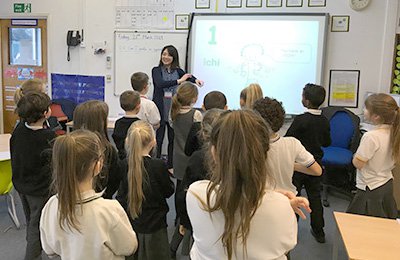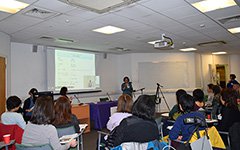2019 Japanese-Language Assistants’ Report: Experiences, Learning, and Challenges in London
The Japan Foundation, London
HORIE Marika
Listening to people's conversations on London's crowded subway system during the daily rush hour, it's easy to forget that English is the official language of the country as there are so many different languages spoken here. In such an environment where I am stimulated by the differences in language and culture on a daily basis, it is very interesting and rewarding to be able to work on "Japanese." It has been about a year since I was posted to the Japan Foundation, London (hereafter referred to as "JF London") in July 2018, and I would like to introduce the various kinds of work I have experienced as a Japanese-Language Assistant (hereafter referred to as "Assistant").
Primary Education Initiatives
In recent years, JF London has placed particular emphasis on supporting Japanese language education in primary and secondary schools. We provide support through a wide range of activities and events, including a funding program called the Japanese Language Local Project Support Programme, the Japanese Taster for Schools Programme, in which Japanese volunteers visit primary (elementary) and secondary (junior high) schools to give Japanese language experience courses, Japanese-language teacher training, speech contests, and teaching material development. Here, I would like to talk about our efforts in primary education, in which we are deeply involved.

Japanese language experience course
This year, I was fortunate enough to have the opportunity to participate in the "Japanese Day" event at a primary school that has started a new Japanese language club through the JF London funding program, as well as to teach a Japanese language experience course. The first thing that struck me when I visited this primary school in the suburbs of Bristol was the diversity of the students. Many of the students have parents from various backgrounds and English is their second language. In this environment where it is natural for people to be different from each other, I was impressed to see that even though they are in primary school, they are already interested in and ready to learn about cultures and languages different from their own. It was a full day of experiencing Japanese language and culture through classes on "Japan" (Kanji, calligraphy, origami, haiku, radio gymnastics, nursery rhymes, etc.) prepared by each class teacher. I taught Japanese in three classes. It was the first time for me to teach Japanese to Year 3 to 5 (7 to 9 years old) students, and the moment I entered the class, I was overwhelmed by the overflowing energy of the students, but it was very interesting to teach them using my whole body to respond to their energy. Even after the class was over, I was asked many questions about Japan and students talked to me using the Japanese they had learned, while some who had never seen a Japanese person before stared at me curiously... The various reactions of the students were very cute and I felt the fun and excitement of teaching primary school students. At the same time, however, I was reminded of the current situation where it is difficult to continuously introduce Japanese in primary schools. Even if you take the trouble to start a Japanese language program, once the funding period is over, the school's budget and the principal's decision to continue the program will determine whether you can continue or not. In addition, in many primary schools, there are few teachers who can teach Japanese in the first place. In order to prevent such practical problems from becoming barriers in primary schools that are eager to introduce and continue Japanese language learning, our future task is to provide support from various angles, such as cross-curriculum and other teaching materials, and training teachers who can teach them.
There are several other projects underway in the UK to promote interest in the Japanese language and culture as interest in Japan grows even more in the run-up to the 2020 Tokyo Olympics and Paralympics. One of the projects has been ongoing since the "Coventry Young Ambassador Japan Conference" held in March 2018. Currently, in response to a request to create teaching materials for primary education, I am creating photo-based slide presentations on a total of 12 topics, including "food" and "primary school life" in Japan. Even within each topic, it is a difficult task to decide what information to include, which pictures to use, and how to create them with limited resources, but I am working on assisting in the creation of these materials through repeated trial and error so that they will be of interest to primary school students.
Other Duties

Workshop held in a hybrid format
The work of Assistants at JF London is not limited to primary, secondary and further education support projects. I am also in charge of the "Let’s NihonGO!" column in the monthly magazine "ZOOM JAPAN," as well as several pre-visit Japanese courses requested by various organizations such as the JET Programme, Japan Society for the Promotion of Science (JSPS), Rugby Football Union (RFU), British Olympic Association (BOA) and other organizations. In addition, in April 2019, with the British Association for Teaching Japanese as a Foreign Language (BATJ), we co-hosted a workshop in a hybrid format that allowed participants to attend online as well as at the venue. I feel it is a privilege to be an Assistant and to be able to see up close and learn the process of creating detailed training plans by Japanese-Language Senior Specialists, and to have the opportunity to actually practice while being taught new IT knowledge. For the remainder of the year, I want to continue to learn and absorb various things while actively engaging in my duties.
- What We Do Top
- Arts and Cultural Exchange [Culture]
- Japanese-Language Education Overseas [Language]
- Japanese-Language Education Overseas [Language] Top
- Learn Japanese-language
- Teach Japanese-language
- Take Japanese-Language Test
- Know about Japanese-language education abroad
- The Japanese-Language Institute, Urawa
- The Japanese-Language Institute, Kansai
- Japanese-Language Programs for Foreign Specified Skilled Worker Candidates
- Japanese Language Education for Japanese Children Resident Overseas and for the Descendants of Migrants
- Archives
- Japanese Studies and Global Partnerships [Dialogue]
- JF digital collection
- Other Programs / Programs to Commemorate Exchange Year
- Awards and Prizes
- Publications
